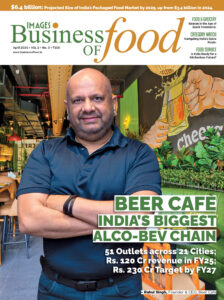With the Union Budget 2025 just around the corner, it’s a pivotal time for discussions and perspectives on its potential impact on the economy and various sectors. Below are quotes by some of the most prominent retail leaders and their opinions, expectations and reviews on the policy rollout.
Rohan Bhargava, Co-Founder, CashKaro and EarnKaro

“As we approach the Union Budget 2025-26, there is a strong need for measures that address the evolving dynamics of India’s retail sector, which witnessed a 7% surge during the recent festive season, with food and grocery leading at 14%. Retailers are eagerly looking forward to the faster implementation of the National Retail Policy, which can provide a structured framework to support growth. Additionally, initiatives such as low-interest financing and targeted tax breaks could ease operational challenges, especially for MSMEs. Promoting technology adoption in retail is equally crucial to help traditional players compete effectively with the growing quick commerce segment. A budget with these measures can unlock significant potential, driving sustained growth and innovation in the retail ecosystem.”
Swati Bhargava, Co-Founder, CashKaro and EarnKaro

“As the e-commerce sector continues to shape India’s digital economy, the Union Budget 2025-26 presents an opportunity to address key areas that can drive its next phase of growth. Clearer regulations around inventory norms, marketplace roles, and consumer protection are essential for creating a stable and predictable business environment. Additionally, expanding digital infrastructure, particularly in rural areas, can unlock untapped markets and boost rural economies by bringing more consumers and businesses online. Promoting digital payments is equally critical, as it enhances financial inclusion, streamlines transactions, and fosters transparency across the ecosystem. We expect that budget 2025 prioritizes these aspects which can strengthen the e-commerce industry’s foundation and accelerate its contribution to India’s economic progress.”
Neeti Sharma, CEO, TeamLease Digital

“The retail sector is looking to the government for targeted reforms that can drive consumption and economic resilience. Key measures such as low-interest financing, tax relief, and an accelerated rollout of the National Retail Policy are expected to address structural gaps and enhance ease of doing business. These changes will foster growth and formalisation within the sector, while boosting consumer sentiment. Additionally, extending MSME benefits to retail and wholesale traders, alongside recognizing the F&B retail sector as an essential service, will be pivotal in supporting broader economic objectives and strengthening sectoral growth.”
Rajat Agrawal, CEO, Barista Coffee

“The restaurant industry has been long waiting at the doors without much being granted to the kitty, would expect the following as part of this budget:
● A single-window policy for faster restaurant openings, uniform licensing across states, and seamless renewals;
● Availability of input tax credit on Opex and capital spending will assist in passing on GST benefits to customers, and reducing operational expenses will encourage the opening of new restaurants, thereby creating more jobs and revenue;
● Easy permissions & licensing for 24*7 operating formats;
● Incentives based on business scale and workforce deployed;
● Relaxed lending policy for retailers to have credit availability basis scale and without collateral.”
Varun Tangri, Founder & CEO, QueueBuster

The Indian retail sector demonstrated robust growth in 2024, surging by 7% during the festive season, driven primarily by a 14% uptick in the food & grocery segment, according to the Retailers Association of India (RAI). With this momentum, industry stakeholders are calling on the government to use the Union Budget FY25-26 as a pivotal tool to address longstanding structural challenges, boost consumer spending, and enhance the ease of doing business.
Gagan Anand, Founder, Scuzo Ice ‘O’ Magic

“MSMEs have many hopes from the upcoming budget. Currently, the government has many policies to support the MSMEs including support in funds, however the ground reality is not as simple as it is on paper. The whole process of getting the support from the government via these policies is a very lengthy process, it shows that these policies are there just for the sake of showing the effort as the entrepreneurs and Private Limited companies are not able to avail the policy even after fulfilling the required criteria. I suggest that if the government actually wants to support the MSMEs they should make a Single Window Support System (एकल खिड़की) so the process is more smooth and easy to use. The ease would further enable the business section to in turn support the economy of the company by creating more employment.”
Aji Nair, CEO, Mirah Hospitality

“As we approach the Union Budget 2025, the F&B sector looks forward to measures that address key challenges such as rising food inflation, operational costs, and the intricate tax structures on alcohol and aerated beverages that impact profitability. A progressive framework that fosters innovation, simplifies policies, and enables sustainable growth will be pivotal for the industry’s success.
The restaurant sector specifically urges the restoration of the GST Input Tax Credit, which would significantly ease operational expenses and enhance efficiency. Additionally, revisiting the GST notification on commercial leases under the Reverse Charge Mechanism is essential to reduce financial burdens. With these steps, the sector can focus on innovation, customer experiences, and long-term growth.”
Paritosh Ladhani, JMD, SLMG Beverages

“As India gears up for this pivotal budget, there is an overarching need to focus on key sectors like manufacturing, infrastructure, skill development, and consumer empowerment, which are vital for GDP growth.
In anticipation of Budget 2025, it is crucial to strike a balance between fiscal consolidation and growth-oriented reforms. The government should aim to stimulate private investment and consumer spending through targeted tax relief, which can increase disposable income and bolster economic activity. Enhancing support for flagship programs such as Make-in-India, Ease of Doing Business, and the Production-Linked Incentive scheme is essential, with particular attention to sectors like manufacturing, food & beverage, and hospitality. These measures can catalyze the next phase of India’s economic growth, harnessing the country’s demographic dividend and enhancing power consumption.
Key aspects like tax reforms, GST simplification, and protecting domestic industries should be prioritized to set the stage for sustainable economic growth.”
Ramadass Selvaraj, Chief Operating Officer, Pathfinder Global

“We are looking forward to the Union Budget 2025, as it presents an excellent opportunity to further strengthen the growth of the quick commerce sector and empower small retailers, including Kirana stores. The retail landscape in India is evolving rapidly, and we anticipate the introduction of regulatory actions that will support the integration of advanced technology, particularly for small businesses. With the rise of digital-first platforms, it’s more critical than ever to ensure small businesses are equipped with the right tools to stay competitive. We expect the government to focus on policies that enhance the adoption of AI, streamline operations, and create more efficient supply chains for these retailers. We believe the Union Budget will pave the way for small retailers to embrace these transformative technologies, enabling them to elevate customer experiences, optimize their operations, and remain relevant in this fast-evolving market. As the retail sector shifts towards a hybrid model that blends digital and physical experiences, the industry must empower retailers to leverage technology and adapt to this new era of retail. We are confident that these changes will level the playing field and foster sustainable growth across the sector.”
Vikram Agarwal, Managing Director, Cornitos

“With the Union Budget 2025, we are optimistic about measures to boost the snacking sector through tax rationalization, incentives for domestic manufacturing, and streamlined export processes. Investments in improved farming practices, renewable energy initiatives, and agricultural infrastructure can create a robust ecosystem for food processing, fostering long-term growth for homegrown brands like Cornitos while enhancing global competitiveness”.
Sandeep Jain, Founder & MD, Desi Masala

“Over the past few years, the restaurant industry has not only contributed substantially to economic growth but has also been a steadfast source of employment generation. As we move closer to the Union Budget 2025, the restaurant sector has high expectations from the government. One critical aspect that needs urgent attention has been reinstating input tax credit (ITC) for the industry. The budget needs to revisit the input tax credit on GST for the sector as this would help reduce operational costs and improve profitability. Other key areas include tax incentives, easier credit access, rationalising licences and regulations, and other policy support to promote business growth. Another prominent demand of the restaurant sector is granting industry status as this will enable them to get financial benefits such as loans at lower interest rates, special schemes, subsidies, fast track clearance processes for licenses etc. An industry status to the food service sector will also encourage entrepreneurship. Overall, these measures will definitely boost sustained growth of the restaurant industry, which contributes significantly to economic activity.”
Shriti Malhotra, Group CEO, Quest Retail

“As we look ahead to the Union Budget 2025-26, The Body Shop India remains hopeful for policies that will uplift the retail sector especially fostering Youth employment, sustainable practices and inclusivity in hiring. Private consumption is the cornerstone of retail growth and we look forward for government policies to open up the purse strings of consumers through higher tax exemptions slabs and reducing GST on essential personal care products could provide much-needed relief to the middle class. This would not only boost disposable incomes but also help consumers uplift their ability to purchase high-quality, ethical products that align with consumers’ growing preference for quality & sustainable choices.
We also urge the government to prioritize incentives for green initiatives, such as incentives to retailers for adopting sustainable packaging and energy-efficient retail operations. Furthermore, expediting the implementation of a National Retail Policy is critical. Simplifying compliance processes, improving logistics in Tier 2 and Tier 3 cities, driving ease of business & providing targeted incentives for small retailers can create a more level playing field.
Investments in Retail skill development programs, especially in adopting digital marketing and technology are also essential to building a future-ready retail sector, capable of meeting evolving consumer expectations.
A progressive budget that addresses these priorities can stimulate private consumption, strengthen retail, and create a resilient ecosystem that balances economic growth with environmental and social responsibility.”
Ashvini Jakhar, Founder and CEO, Prozo

“As India strides toward its ambitious goal of becoming a $7 trillion economy by 2030, the logistics sector is poised to play a pivotal role in driving this transformation. The government’s record-breaking Rs, 11 lakh crore infrastructure investment has laid a robust foundation with initiatives like multi-modal transport systems, dedicated freight corridors, and enhanced connectivity. The next critical step is translating these efforts into a globally competitive logistics ecosystem. This requires an intensified focus on technology integration. Advanced supply chain solutions powered by AI can boost efficiency, optimize resources, and build more resilient networks.
The logistics industry is also a lifeline for MSMEs, the backbone of India’s economy, enabling them to reach markets efficiently and scale operations domestically and globally. Additionally, the rapid rise of e-commerce and quick commerce has further underscored the need for robust, tech-enabled logistics solutions to meet consumer expectations for faster deliveries and seamless experiences. Strengthening the last-mile delivery network and adopting predictive analytics for inventory and demand planning are crucial to sustaining this growth. Green logistics practices, such as sustainable last-mile delivery systems and LNG-fuelled trucking, offer opportunities to minimize the sector’s carbon footprint. As we approach the Union Budget, it is imperative to introduce measures that incentivize innovation, promote digitalization, and strengthen the foundation of India’s commerce. These initiatives will not only position the logistics sector as a key growth driver but also establish India as a global leader in supply chain excellence.”
Prasuk Jain, Managing Director, Snow World Entertainment & Prasuk Jain Hospitality

“The upcoming budget offers a chance to simplify tax structures for food, beverage, and recreational activities, fostering consumer engagement and operational efficiency. Addressing classifications for automobiles and components can eliminate complexities, ease compliance, and encourage innovation, driving growth across connected industries.”
Vikesh Shah, Founder, 99 Pancakes

“At 99 Pancakes, we are committed to redefining the QSR dining experience & we are hopeful about the Union Budget 2025 to address key grown enablers for our F&B Industry. This sector has been brawling with inflating operational & input costs. With a reduction in GST on dining services along with a tax alleviation on sustainability packaging could be of crucial assistance. Scalability & Market Expansion could be the necessary impact driven from adopting advanced kitchen technologies leading to operational efficiency. Such robust measures accredit brands like ours to continue striving towards innovation, amplifying customer experience & contributing to our country’s economic momentum.”
Nidhi Singh, Co-Founder, Samosa Singh

“Being a F&B brand dedicated to prioritizing quality and innovation, we look forward to the Union Budget 2025 reforms that may vicariously fuel the growth of startups pertaining to the former. Swiftly approved policies that would potentially simplify taxation, and promote sustainable business practices can act as promoters for escalating startups like ours. F&B sector being in the focus, stimuli for local sourcing, reduced taxes on essential supplies, facilitated support for cold-chain infrastructure, can result in significantly impacting operational efficiency and product quality in the constructive manner. We hope that implementation of this budget would make provisions for a far more resilient and thriving startup ecosystem, and be the breath of prerequisite fresh air.”
Simranjeet Singh, Director, CYK Hospitalities

“The upcoming Union Budget 2025 is quite expected to have reforms for innovation. For start-ups and food and beverage (F&B) sectors, there is also great hope for simplified taxation, namely GST rate cuts on small eateries and essentials-those will ease financial stress. A very strong push has been made towards subsidies on packaging that preserve the environment so that food becomes scarce, aligning it to the perceptions of global sustainability. Increased budgetary support to food processing facilities might as well drive off multiple rural jobs and boost exports. Start-ups are also demanding continued tax exemptions and the removal of angel taxes so as to attract more funding. Investments into Tier 2 and Tier 3 cities will benefit from policy environments that promote digital ecosystems to stimulate innovation, especially in agri-tech, health-tech and green-tech.”
Balasubramanian A, Senior VP and Business Head at TeamLease

“The year 2024 was marked by resilience and adaptability for India’s FMCG sector. While the sector grew by around 7%, demand remained muted in urban areas owing to inflationary pressures, while rural expansion outpaced that of urban areas by nearly 20%, especially in the food and beverages segment. The sector is projected to expand by 9.5% in 2025. driven by continued rural expansion and demand for premium and sustainable products in urban areas. While some green shoots are already visible, the second half of 2025 is expected to drive more growth than the first half. To sustain growth momentum in such a challenging environment, targeted interventions to boost workforce productivity will be essential – initiatives like digital upskilling programs, the development of robust and adaptive distribution networks, and improving rural market penetration through a multi purpose workforce. Additionally, fostering collaborations between industry players and government agencies will be crucial to address skill gaps and ensure the workforce is equipped to navigate the evolving demands of the sector. The FMCG sector expects Budget 2025 to address inflation, boost rural consumption, simplify GST, and support R&D, e-commerce, and sustainability initiatives, alongside lower taxes on essentials and health-focused products to drive growth.”
Gaurav Grover, CEO, ofi India

“The industry has reasons to be optimistic about this year’s Union Budget and hoping it builds on the positive steps from last year. We’re expecting that this Budget will prioritize boosting high-yielding, climate-resilient crops and natural farming practices. These measures can go a long way in supporting the government allocation of Rs. 1.52 lakh crore to agriculture and allied sectors as announced in the previous budget. As we look ahead to the upcoming Union Budget, the food processing industry has high hopes for measures that can enhance ease of doing business. Simplified tax processes, reduced complexities in regulations, and faster GST refunds could be game changers in the food ingredient manufacturing sector, enabling smoother operations, and enhancing competitiveness. Better infrastructure—like improved logistics, cold chain facilities, and connectivity—would also go a long way in cutting transportation costs, and ensuring products move efficiently across the supply chain. With a growing focus on increasing disposable income for the middle class, we also hope for initiatives that drive growth in domestic demand, which will fuel opportunities for high-quality, processed food products. These initiatives have the potential to bring multiple benefits to the sector: lower raw material costs, develop new market opportunities, improve access to credit, extend product shelf life, and even facilitate exports. The food and beverage ecosystem has much to gain if these priorities are addressed.”




